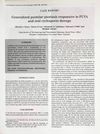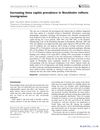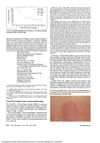2 citations,
March 2022 in “PubMed” Nutrafol® and Viviscal® can slightly help hair growth in hair loss.
 15 citations,
November 1997 in “Australasian Journal of Dermatology”
15 citations,
November 1997 in “Australasian Journal of Dermatology” A combination of oral cyclosporin and PUVA treatment worked well for a severe skin condition called generalized pustular psoriasis.
 January 2007 in “The Year book of dermatology”
January 2007 in “The Year book of dermatology” Finasteride with oral contraceptive improves hair loss in 62% of premenopausal women.
 5 citations,
June 2018 in “Actas Dermo-Sifiliográficas”
5 citations,
June 2018 in “Actas Dermo-Sifiliográficas” In 2017, Spanish dermatologists commonly prescribed topical minoxidil, oral finasteride, and nutricosmetics for hair loss, with oral contraceptives also used for premenopausal women. Less common were oral dutasteride, due to side effects, and newer, more expensive treatments like topical finasteride and Low-Level Laser Therapy. The conclusion is that there's a need for prescription guidelines due to varied treatment approaches.
 32 citations,
July 2017 in “Clinical and Experimental Dermatology”
32 citations,
July 2017 in “Clinical and Experimental Dermatology” Finasteride effectively treats hair loss in transgender men with few side effects.
30 citations,
February 2016 in “British journal of dermatology/British journal of dermatology, Supplement” Some medications can reduce excessive hair growth in women, but more research is needed to find the best treatment combinations.
 1 citations,
March 2023 in “International journal of rheumatic diseases”
1 citations,
March 2023 in “International journal of rheumatic diseases” Relatives of lupus patients show signs of immune system activity but not full-blown lupus.
January 2023 in “Revista Eletrônica Acervo Saúde” February 2023 in “Seven Editora eBooks” Oral minoxidil has more side effects but can be more effective than topical minoxidil.
December 2022 in “Journal of The American Academy of Dermatology” Low-dose oral minoxidil combined with topical minoxidil improves hair growth in breast cancer patients with therapy-induced hair loss.
 2 citations,
January 2014 in “Advanced Biomedical Research”
2 citations,
January 2014 in “Advanced Biomedical Research” Oral isotretinoin and cyproterone compound are equally effective for treating acne in women with cutaneous hyperandrogenism.
 January 2012 in “Yearbook of Dermatology and Dermatologic Surgery”
January 2012 in “Yearbook of Dermatology and Dermatologic Surgery” Studying acne-related syndromes helps us understand acne causes and can lead to new treatments.
 January 2012 in “Journal of the American Academy of Dermatology”
January 2012 in “Journal of the American Academy of Dermatology” 2011 dermatology discussions highlighted stem cell hair treatments, new lichen planopilaris therapies, skin side effects from cancer drugs, emerging allergens, and the link between food allergies and skin issues.
 July 2023 in “Journal of medical and health studies”
July 2023 in “Journal of medical and health studies” A 3-year-old with vitamin D-resistant rickets and severe hair loss died despite treatment, highlighting the need for improved management of the condition.
 1 citations,
June 2024 in “International Journal of Dermatology”
1 citations,
June 2024 in “International Journal of Dermatology” More research is needed to see if non-English speakers are also more interested in oral minoxidil.
 15 citations,
September 1992 in “The Lancet”
15 citations,
September 1992 in “The Lancet” Stopping minoxidil caused significant hair loss, but regrowth occurred after resuming use.
 54 citations,
September 2012 in “Dermatologic Clinics”
54 citations,
September 2012 in “Dermatologic Clinics” Some medications can cause hair loss, but stopping the drug usually leads to recovery within 3 months.
 January 2012 in “Yearbook of Dermatology and Dermatologic Surgery”
January 2012 in “Yearbook of Dermatology and Dermatologic Surgery” Low-dose isotretinoin is as effective as conventional doses for acne and has fewer side effects.
 1514 citations,
December 2011 in “Fertility and sterility”
1514 citations,
December 2011 in “Fertility and sterility” Experts agree that PCOS affects women's health in complex ways, but more research is needed to understand and treat it effectively.
 1 citations,
December 2022 in “Actas dermo-sifiliográficas/Actas dermo-sifiliográficas”
1 citations,
December 2022 in “Actas dermo-sifiliográficas/Actas dermo-sifiliográficas” Sensitive scalp causes discomfort and hair loss, treated with personalized care.

Non-adherence to medication in Egyptian SLE patients leads to more hospitalizations and symptoms.
 3 citations,
January 2010 in “Expert Opinion on Pharmacotherapy”
3 citations,
January 2010 in “Expert Opinion on Pharmacotherapy” No treatment fully stops excessive hair growth in women, but various methods can help manage it effectively.
 20 citations,
July 1990 in “Pediatrics in Review”
20 citations,
July 1990 in “Pediatrics in Review” The four main causes of hair loss in children are fungal infections, pulling out hair, autoimmune hair loss, and stress-related hair shedding.
 52 citations,
January 2004 in “Medical mycology”
52 citations,
January 2004 in “Medical mycology” The rise in tinea capitis cases in Stockholm is linked to increased African immigration.
42 citations,
May 2009 in “Contraception” The oral contraceptive with ethinyl estradiol and chlormadinone acetate is effective in treating moderate acne.
 1 citations,
January 2023 in “IDCases”
1 citations,
January 2023 in “IDCases” A patient experienced severe hair loss after getting an mRNA COVID-19 vaccine.
38 citations,
November 2006 in “Pediatric dermatology” Infants with scalp injuries developed a skin condition that improved with steroid creams.
 11 citations,
February 2008 in “British journal of nursing”
11 citations,
February 2008 in “British journal of nursing” Idiopathic hirsutism causes excessive hair growth in women, can be treated with medication and hair removal, but cannot be fully reversed.
 96 citations,
September 2008 in “Seminars in Cutaneous Medicine and Surgery”
96 citations,
September 2008 in “Seminars in Cutaneous Medicine and Surgery” Hormonal treatments, including birth control and antiandrogens, can effectively treat acne in women.
 8 citations,
July 1990 in “Archives of Dermatology”
8 citations,
July 1990 in “Archives of Dermatology” A woman had a skin reaction from a cough suppressant, dextromethorphan, which is a new cause of fixed-drug eruption.






















